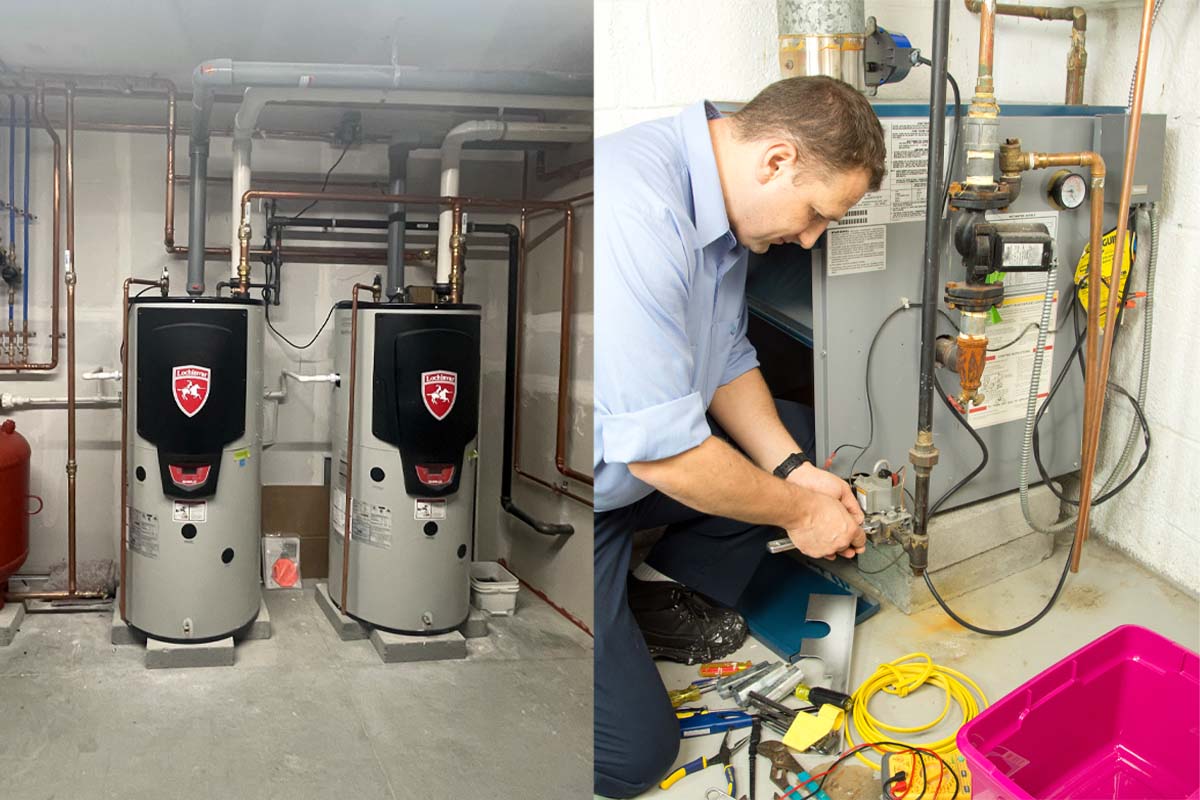While, on the most basic level, both boilers and water heaters do the same thing- heat water- they’re not interchangeable terms.
They both may heat water but a boiler is used to power your heating and a water heater provides hot water for your taps. There’s some overlap with combined systems but we’ll get into those later.
So, boiler vs water heater: what are the similarities and differences?
Boiler vs Water Heater:
There’s a lot of overlap between the systems but the key difference is in how they’re most commonly used.
Boilers supply heat for your home. The water they produce is generally not potable (though there are exceptions) and very hot.
Water Heaters heat water for things like having a bath or washing the dishes. It’s usually not so hot that you’ll hurt yourself.
In more modern systems, a single unit can perform both jobs, but these are still relatively uncommon in the US.
Why do I have a boiler and a hot water tank?
In the US, most homes have separate systems for heating water for domestic use (i.e. washing the dishes or yourself) and heating the home. Depending on which system you have installed, you might have both a boiler and a hot-water cylinder, or even two hot water tanks. Other homes may have no tanks at all!
It all depends on what you or the people who owned your home when the system was installed decided when they asked, “boiler vs water heater: which is right for us?”.
What Is A Boiler?
A boiler does exactly what the name suggests- it heats water to near boiling in a sealed tank which is then pumped around your home to provide heat.
They can be powered by burning gas, propane or oil or run on electricity and the water they heat travels around the system in a loop, warming your home as it goes.
There are 3 common types of boilers. Each one works slightly differently:
Conventional Boilers
Also known as a “traditional boiler”, this style has been around for a long time, but don’t think it’s outdated. Manufacturers continue to improve their models and they can offer fantastic efficiency.
A large tank of cold water feeds into the boiler tank where it’s heated before being pumped around the system.
These are great for larger homes- if you’ve got lots of radiators, a conventional system might be right for you.
System Boilers
These work much like conventional boilers with the exception that they take their cold water supply directly from the mains. They take up less room as there’s no cold-water feed tank.
Again, these are great if you have a lot of radiators and don’t have the loft-space for a cold-water tank.
Combi boilers
While not very common in the US, Combi boilers are the UK’s favoured design and they can provide both heating and hot water for domestic use.
Not only are they more compact than either conventional or system boilers, having no storage tank, they can provide heating and hot water on demand.
On the downside, if you have a larger home and need to run hot water to different parts concurrently then your water pressure can suffer.
Pros and Cons of Boiler Systems:
As with any system, there are pros and cons to boilers when compared to other forms of heating.
Pros
- Energy efficient: Modern boilers are often up to 94% efficient, turning almost all the energy they use into heat.
- Whole home heating: If you want to heat your whole house a boiler and radiator system is the simplest way.
- Cheap to run: Depending on the fuel burnt, boilers can be the most cost efficient heating system to run.
Cons
- High up-front costs: Installing a new boiler system isn’t cheap.
- Risk of leaks: Using water to heat your home comes with the risk of burst pipes.
- Debatable Environmental value: While there is a solid argument that natural gas boilers are amongst the most eco-friendly heating systems, as the energy mix changes, this is becoming less true.
What Is A Water Heater?
While most boiler systems focus on heating the home, water heaters specialize in heating the water that comes out of your faucets.
Water is fed into the top of the heater and then heated to a pre-set temperature by either an electrical element or a gas flame before being fed either to a storage tank or directly to your faucets, depending on your system type.
Tanked Systems
In a tanked system, water is fed into the heater and then, once heated, moved into an insulated storage tank until you turn on the taps.
These can be either electric or natural gas powered and represent the vast majority of water heaters in use in the US.
Pros:
- Cheap to install: Tanked systems are fairly simple and cost effective to install.
- Easy to maintain: Thanks to their straight-forward design, tanked systems can be cleaned and maintained very easily.
Cons:
- Produces a limited supply: Once the contents of the storage tank have been used, there is a delay as more water is heated.
- Bulky: Because they require a storage tank, these systems take up a lot of space in comparison to tankless systems.
Tankless Systems
The main difference between a tanked and tankless system is fairly obvious- a tankless system doesn’t have a storage tank. Instead, water is heated on demand.
Pros:
- Unlimited hot water: As water is heated on demand, tankless systems can’t run out of hot water.
- Energy efficient: Because water is heated as required, there’s no heat lost during storage.
- Cost effective to run: If your water usage is generally fairly low, tankless systems can offer significant savings on bills.
- Space saving: Because they don’t require a 50-gallon storage tank, tankless systems can be tucked away.
Cons:
- Costly to install: As a more complex system, tankless water heaters often cost more to install.
- May require multiple units: Depending on your usage and the size of your property, tankless systems may require boosters or even separate heaters.
Boiler Vs Water Heater: Key Differences
1. Functions and usages
While systems that combine both jobs are becoming more commonplace, it’s still far more usual in US home to have a boiler to supply heat to the home and a separate water heater for hot water.
2. Distribution system
While a boiler will pump water around your home in a closed loop when the heating is on, a water heater will store it (or heat it on demand) until you turn on the faucet.
3. Components and Complexity
While there are some very simple boilers and rather complex water heaters out there, the general rule of thumb is that water-heaters are the simpler of the two systems.
More modern units may be significantly more complex than older-style ones, involving a lot more technology, but more than make up for it in increased efficiency.
Boiler Vs Water Heater: Choosing the Right System For Your Home
When it comes to replacing your heating or hot water system, there’s a good number of factors to consider:
1. Home Size
A tanked water heater and a conventional boiler might be the ideal system if you live in a high-demand, large home. If you have a smaller apartment, this is probably not the way to go.
2. Running costs vs Installation Costs
Unfortunately, it’s not as simple as saying X system costs Y to run and this one costs this to install.
Depending on the amount of hot water or heating you use, how well insulated your home is and numerous other factors, one system may have advantages over another in terms of energy savings.
Equally, which fuels are available in your area is a major factor. Natural gas is usually the cheapest to burn, but if you live in a sunny place, solar may change the equation.
Likewise, different homes will require more or less work to install different systems, depending on size and what system was there previously.
3. Environmental Concerns
Weighing up how eco-friendly a given system is is an important part of any decision.
Unfortunately, it’s not as simple as you may think. With the national and local energy mixes changing year after year, what makes sense today might not tomorrow.
4. Maintenance Requirements and longevity
Another factor to consider before making a choice is the maintenance and just how involved that may be over the lifetime of a system.
In general, old-fashioned systems like conventional boilers and tanked water heaters are fairly easy to keep running, whereas more complex systems require more care, whether this outweighs other factors is a matter for debate.
When To Consult A Professional
Regardless of where you come down on the issues of the boiler vs water heater debate, installation is always a matter for a professional. No matter the system you opt for, the risk of disaster from a badly installed system is huge.
Likewise, most repairs should be left to those who are qualified and competent.
Even before you start the installation process, it’s always a good idea to talk through your options with someone who knows the ins and outs of heating water properly.

